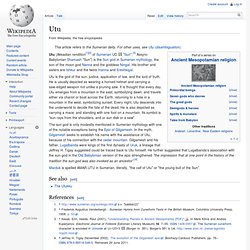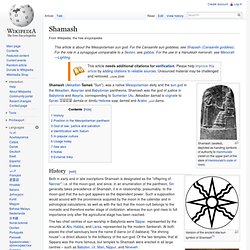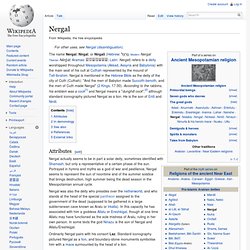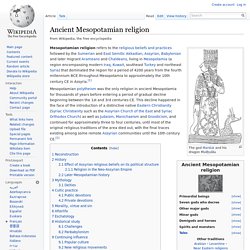

Utu. Utu is the god of the sun, justice, application of law, and the lord of truth.

He is usually depicted as wearing a horned helmet and carrying a saw-edged weapon not unlike a pruning saw. It is thought that every day, Utu emerges from a mountain in the east, symbolizing dawn, and travels either via chariot or boat across the Earth, returning to a hole in a mountain in the west, symbolizing sunset. Every night, Utu descends into the underworld to decide the fate of the dead. He is also depicted as carrying a mace, and standing with one foot on a mountain. Its symbol is "sun rays from the shoulders, and or sun disk or a saw". The sun god is only modestly mentioned in Sumerian mythology with one of the notable exceptions being the Epic of Gilgamesh. Marduk is spelled AMAR.UTU in Sumerian, literally, "the calf of Utu" or "the young bull of the Sun". See also[edit] The Utukku References[edit] External links[edit] Ancient Mesopotamian Gods and Goddesses: Utu/Šamaš (god) Shamash. Version of the ancient star/sun symbol of Shamash[1] Shamash (Akkadian Šamaš "Sun"), was a native Mesopotamian deity and the sun god in the Akkadian, Assyrian and Babylonian pantheons.

Shamash was the god of justice in Babylonia and Assyria, corresponding to Sumerian Utu. Akkadian šamaš is cognate to Syriac ܫܡܫܐ šemša or šimšu Hebrew שֶׁמֶשׁ šemeš and Arabic شمس šams. History[edit] The two chief centres of sun-worship in Babylonia were Sippar, represented by the mounds at Abu Habba, and Larsa, represented by the modern Senkerah. Position in the Mesopotamian pantheon[edit] According to the 1911 edition of the Encyclopædia Britannica the Shamash cults at Sippar and Larsa so overshadowed local sun-deities elsewhere as to lead to an absorption of the minor deities by the predominating one.
Another reference to Shamash is the Babylonian Epic of Gilgamesh. God of law, justice and salvation[edit] The attribute most commonly associated with Shamash is justice. Identification with Saturn[edit] Nergal. The name Nergal, Nirgal, or Nirgali (Hebrew: נֵרְגַל, Modern Nergal Tiberian Nērḡál; Aramaic ܢܹܪܓܵܐܠ; Latin: Nergel) refers to a deity worshipped throughout Mesopotamia (Akkad, Assyria and Babylonia) with the main seat of his cult at Cuthah represented by the mound of Tell-Ibrahim.

Nergal is mentioned in the Hebrew Bible as the deity of the city of Cuth (Cuthah): "And the men of Babylon made Succoth-benoth, and the men of Cuth made Nergal" (2 Kings, 17:30). According to the rabbins, his emblem was a cock[1] and Nergal means a "dunghill cock",[2] although standard iconography pictured Nergal as a lion. He is the son of Enlil and Ninlil. Attributes[edit] Nergal actually seems to be in part a solar deity, sometimes identified with Shamash, but only a representative of a certain phase of the sun. Ordinarily Nergal pairs with his consort Laz. In the late Babylonian astral-theological system Nergal is related to the planet Mars. In demonology[edit] See also[edit] References[edit]
Mesopotamian religion. The god Marduk and his dragon Mušḫuššu Mesopotamian religion refers to the religious beliefs and practices followed by the Sumerian and East Semitic Akkadian, Assyrian, Babylonian and later migrant Arameans and Chaldeans, living in Mesopotamia (a region encompassing modern Iraq, Kuwait, southeast Turkey and northeast Syria) that dominated the region for a period of 4200 years from the fourth millennium BCE throughout Mesopotamia to approximately the 10th century CE in Assyria.[1] Mesopotamian polytheism was the only religion in ancient Mesopotamia for thousands of years before entering a period of gradual decline beginning between the 1st and 3rd centuries CE.

Reconstruction[edit] As with most dead religions, many aspects of the common practices and intricacies of the doctrine have been lost and forgotten over time. History[edit] Overview map of ancient Mesopotamia. Akkadian names first appear in king lists of these states circa 2800 BCE. Religion in the Neo-Assyrian Empire[edit] "Enlil!